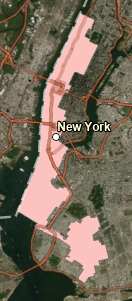Lab 3 [GIS5935]: Data Quality Assessment
The goal of the accuracy assessment
summarized in the map above was to determine quality of road networks provided
by Jackson County GIS compared to a data set provided by the U.S. Census
Bureau. One measure of such quality is the completeness of the data set, or how
comprehensive the coverage of the data set is. As noted by Haklay (2010, pp. 690-692),
one method to make this comparison between two data sets of road networks involves
overlaying a grid over the study area and then calculating the difference in the
total length of line segments in each cell. To get a percentage, one of the
data sets serves as the base (in this case, the Jackson County GIS data set served
this purpose). The calculated percentage can then be positive or negative based
on this formula:
% difference = 100% * (Jackson County GIS
- U.S. Census Bureau)/Jackson County GIS
A positive value indicates
better coverage by Jackson County GIS in the underlying grid cell (noted by
shades of blue). Alternatively, a negative value indicates better coverage the U.S.
Census Bureau in the underlying grid cell (noted by shades of red). In the map
above, the darker the color, the greater the percentage difference between the
data sets, and notably only a handful of cells fall into the outermost percentage
ranges. Incomplete data for this map represents either cells with no road
networks or cases where the denominator would lead to a division by 0 error (i.e.,
there was no road segment in the grid cell for the Jackson County GIS data set).
Also noted in the map
description above the legend, across the 296 grids spanning this area
containing road networks from at least one of these data sets, the U.S. Census
Bureau road networks were more complete in 55% of the 5x5 km grid cells, based on a comparison of the total
length of road segments within each grid.



Comments
Post a Comment